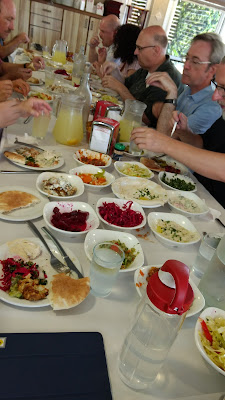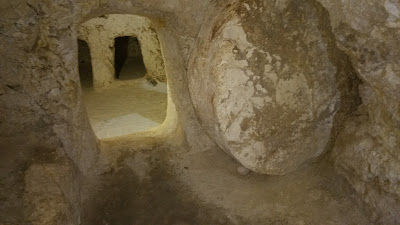 |
In Hebron there are examples everywhere of
people who want you to hear and
understand their story.
|
We had a brilliant lecture from a Jewish woman who decided to get her doctorate in Early Christianity in order to fill the gaps in her understanding of Christians. Sometimes she teaches Jewish text to Jews, sometime Jewish texts to Christians, sometimes Christian texts to Jews and sometimes Christian texts to Christians. Her story is quite compelling, growing up in New Jersey she was surrounded by Christians and Christian culture; but she admits to never having a Christian friend. That didn't happen until she moved to Jerusalem!
She had no interest in Christianity, but found her pursuits in Judaica to be more than satisfying. Then she was invited to an interfaith text study group. She had no interest in such things, but went once and was hooked. We had a wonderful text study today looking at Genesis and Leviticus and the Talmud and the Mishnah and the Gospels...all around the theme of "The other."
What was interesting is that she shared with us that growing up she was not to enter a Christian church, she was not to read the New Testament and she was not to have any association with Christians. Partly this goes back to a very famous Jewish Rabbi named
Maim
onides
https://en.wikipedia.org/wiki/Maimonides . She teaches a class here in Israel where she encourages her students to visit Christian churches to get a better understanding of who we are. However each year several will not show up. Being pious Jews they consult their Rabbi and are told they should not go into a Christian church.
 |
Same neighborhood, but a very different story
being told.
|
My point is not how bad this is to think of Christians this way; but how sad it is that we know so little about each other. We hold on to stereotypes and misconceptions that color our "narratives" in such a way that we are unable to hear each others story. We Christians act surprised that some of our Jewish friends have some reservations about Christians. Our Jewish friends have a story that is based on thousands of years of being treated as less than human, of being outcasts and unwelcome by others. A story of governments who were seemingly prepared to see the Holocaust happen and who did very little about it. Even the US did not allow Jewish immigrants to come to the US after WWII until after the state of Israel was formed. I've come to see that some of our Jewish friends rightfully don't trust anyone and this is understandable.
I know this may shock you, but for some of our Jewish friends they are pretty much prepared for the moment when good folks like us will be lining up to do them harm. And historically they should be concerned, it has happened over and over again. This is why Israel is so important for them: it is a place where a Jew can finally be safe.
 |
| Holocaust memorial in Jerusalem. |
This also makes the modern day conflict with the Palestinians so difficult, because any critique of Israeli national policy is often seen as one more example of being anti Jew at best or continued anti-Semitism at worst.
So how do we break down the walls of suspicion? How do we move forward together? Can we forget the past--no! Maybe we acknowledge the hope that both Jew and Christian share and walk in constant humility. It is a real puzzle; but I think the beginning is the ability to listen to each others story. To just listen. Not try to rationalize it, change it, or even react to it--just listen. What is your narrative and how willing are you to have it challenged or perhaps enriched by the narrative of the other?
 |
Selfie with his honor Oded Revivi, mayor of
Efrat.
|
I had the chance to meet and listen to the mayor of Efrat --a Jewish settlement. And while the issues of Settlements is a very hot topic; it was interesting to listen to him talk as the mayor of a town. His issues where the running of the municipality. Trash, water, safety, schools....all things that I want him to do well with. And trust me he is a very dynamic man, with a very forceful 'can do" spirit. Here's my point, his narrative is to be a good mayor to the people who elected him. To build bridges and to bring peace "not by signing papers on the White House lawn" but by working together and fostering relationships. Now we might say, but Settlements are bad and he shouldn't be there....but the reality is that he is; and the Settlements aren't going away. So, do I condemn his good work in what some would say is a morally precarious settlement or do I rejoice in the gift of good government in that place?
Meanwhile not a couple of miles away a Christian family is being harassed over ownership of land and a farm that is clearly theirs. Even the military has intimidated them and done harm to their property. The owners have received calls saying---how much do you want, a blank check, just give a number. But you see this is their family farm and it's not for sale. Can we also hear their story, respect it and find a way to see it as of equal worth and not in competition or in conflict with the other stories or narratives in this place?
One thing for sure anyone who thinks they understand this place, these people, their issues: either has never spent anytime here or if they did they only talked, ate and worshipped with one particular group, and missed out on several parts of the story.















































